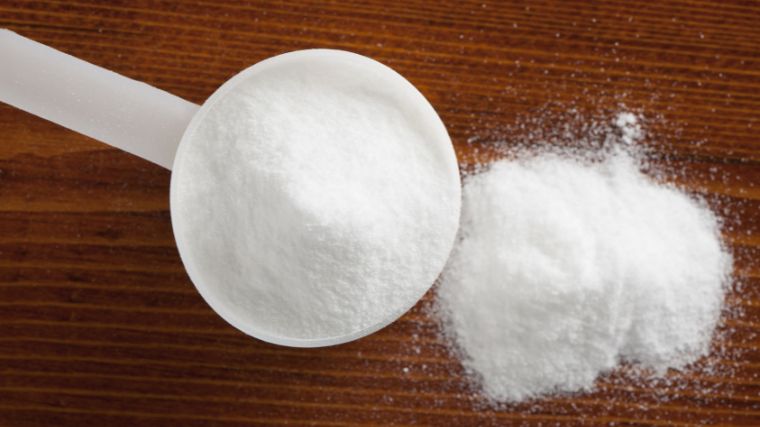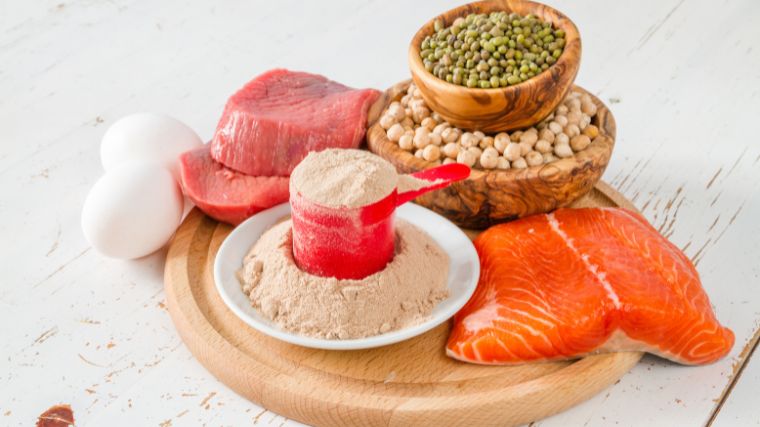[ad_1]
If you’re heavy into tracking your nutrition to get the most out of your time in the gym, you may have tried or wondered about creatine. Creatine is a naturally occurring amino acid that plays a role in energy production. You can get more of it through supplements and some of it through food.
It’s hugely popular with strength athletes for a reason. There are 50 years of research on creatine and its potential to increase your strength and power output, help you build muscle mass, and recover from your workouts. However, just like with any supplement, there’s a chance you’ll experience some side effects.

First, know that creatine is generally considered safe to consume. Many of the initial claims of damaging side effects have been refuted through studies. But you still run the risk of it interacting poorly with your body and the long-term effects are somewhat unknown. Let’s dive into the science of creatine, how it can boost your training, and on the flip side, what you need to know about its potential side effects.
Editor’s Note: The content on BarBend is meant to be informative in nature, but it should not be taken as medical advice. When starting a new training regimen and/or diet, it is always a good idea to consult with a trusted medical professional. We are not a medical resource. The opinions and articles on this site are not intended for use as diagnosis, prevention, and/or treatment of health problems. They are not substitutes for consulting a qualified medical professional.
What Is Creatine?
Creatine is a non-essential amino acid which means it occurs naturally in your body. It is stored mainly in your skeletal muscles, with some of it in your brain. Your body can produce more creatine by synthesizing the amino acids arginine, glycine, and methionine. (1)(2)
After taking in creatine through a supplement, your body stores it in your cells as creatine phosphate. Phosphagens are key to keeping energy available in your body that you can use for highly intense athletic activities like sprinting and weightlifting. Your body naturally has phosphagens and ingesting creatine can increase your phosphocreatine concentration. That’s the whole idea. (1)
[Read More: Nutrition for Athletes — How to Eat for Muscle and Performance]
With more phosphagens in your system, you can produce more ATP — adenosine triphosphate. ATP is needed for cellular energy and it is used for muscle contractions during short-duration, high-intensity exercises. With more stored phosphagens from creatine supplementation, ATP can replenish more quickly. (3) Enter your stock of phosphocreatine to help you hit your next set of super-heavy deadlifts.
Sources of Creatine
You can increase your creatine by eating certain foods or taking supplements. There are many types of creatine supplements to choose from. Creatine monohydrate has been the most studied for its benefits to strength training. (4)
Creatine is a carninutrient — it is only available through animal-based protein-rich food sources. If you don’t eat animal products, you can eat foods that contain the amino acids that are precursors to creatine synthesis: arginine, glycine, and methionine. (2)

[Read More: The Best Foods for Energy Before, During, and After Your Workouts]
It is difficult to get a lot of creatine through any of these food sources — supplements may be more efficient if you are looking to boost your strength gains. On the other hand, if you want to avoid all potential side effects, foods with creatine don’t run the same risks as supplements.
Below is a list of types of creatine supplements and foods with the highest amounts of creatine or creatine precursors to choose from.
How Does Creatine Impact Strength Training?
Creatine is among the most highly-researched supplements in history. There are 50 years of studies suggesting it can potentially increase your strength and power, help you build muscle, and ease your recovery. (1) It may also have cognitive benefits which can translate over to better focus in the gym. (5) Let’s break it all down.
May Increase Strength and Power
Studies show that supplementing with creatine can increase your muscular contractions during highly-intense training — potentially due to its role in increasing your ATP. (1) When you are training heavy squats and deadlifts, your body needs ATP, and with more of it, you’ll have more energy to complete your reps and sets with good form.
Throughout the course of a training program, each session matters. Having more ATP can help you lift heavier and increase your numbers through progressive overload. Creatine is shown to increase your training adaptations. (1) This happens from consistent hard work over time.
[Read More: What Are Workout Splits and Which Is the Best One?]
A 2020 study was done on healthy young adults participating in a resistance training program for six weeks. One group supplemented with creatine and the other group took a placebo. The creatine group significantly increased their strength in the chest press, leg press, and total body strength. (6) Taking creatine alone won’t magically make you stronger, but combining it with quality training might.
Helps Build Muscle Mass
Studies consistently show that supplementing with creatine in combination with resistance training can help you increase your lean muscle mass. (7)
A review of 35 studies on 1195 people examined creatine’s impact on hypertrophy. The people in the studies took creatine and combined it with resistance training, mixed exercise, and no exercise. Those who resistance trained gained two pounds of lean muscle mass and the other groups did not see any gains. (7)
[Read More: The 12 Best Supplements for Muscle Growth (Spring 2023 Update)]
It highlights that taking creatine without training doesn’t cause you to gain muscle mass. But it can help when you combine it with putting in the work in the gym doing your muscle and strength-building workouts.
Improves Recovery
Creatine may help you to recover better from your workouts. Along with carbs and protein, creatine can assist in refilling your glycogen stores after training. (8) Creatine can work as an antioxidant in your body and may play a role in reducing inflammation and muscle soreness. (1)
Because of its ability to increase ATP and energy availability, it may also help you withstand a higher volume of training without fatiguing as quickly — improving your recovery during your session as well. (1)
Boosts Focus
Research on creatine and muscle function has been around for a while, but newer studies also show that creatine can improve your brain health. Your skeletal muscles hold 80 percent of the creatine in your body, and your brain takes the other 20 percent. (5) Because of this, creatine may help improve cognition, processing, and brain function.
Your brain plays a big role in your success at the gym. The ability to focus is key to building a strong mind-muscle connection. Creatine may help you out with reaction time, coordination, and motor control — all key to athletic performance. It can also reduce your perceived amount of mental fatigue which can help you extend your effort and output in your sessions. (5)
Side Effects of Creatine
Creatine has been so heavily studied that there are now studies refuting previous studies claiming creatine could cause damaging side effects. Let’s get up to date on the latest information of what to be wary of when it comes to the potential side effects of creatine.
May Cause Gastrointestinal Distress
Although there has been disagreement about many of the potential side effects of creatine, no one can dispute that it may cause gastrointestinal (GI) distress. Substances affect each individual differently, and if you already have a sensitive stomach, you may be at risk.

[Read More: 5 At-Home Workouts for Strength, Muscle Growth, Power, and More]
The main symptoms that users report are diarrhea, belching, and stomach discomfort. This study on the unpleasant GI effects of creatine notes that too high of a dosage could make the symptoms worse. Taking more than ten grams of creatine per day may increase the odds of gastrointestinal side-effects. (9)
May Cause Short-Term Water Retention
Early on, many claims were made that creatine could cause weight gain — through gaining body fat and retaining a lot of water. In an article reviewing the scientific evidence of these claims, both were found to be false. Creatine has not been found to increase body fat across many ages and genders. (10)
On the water retention side, creatine has not been found to overall increase your total body water, as was originally thought. It can cause short-term water retention in the early stages of ingesting creatine. (10) This can be due to creatine increasing your intracellular volume in the first few days as your body adjusts.
Short-term water retention is now thought to be the main potential side effect of creatine. (4)
Possible Kidney Interactions
It was once claimed that creatine could be harmful to your kidneys. In some cases, when it was combined with other supplements or the dosage was higher than recommended, it was found to cause kidney and liver issues. (4)
Since then, studies have shown that when taken at the recommended dosage, creatine does not cause kidney damage or dysfunction in people without previous or underlying kidney issues. (10) These studies were done on healthy individuals and the effect of creatine on people with kidney issues is currently unknown.
Some limited data note that it may not be advisable for people with pre-existing kidney dysfunction to supplement with creatine, but more research is needed. (11)
Unknown Long-Term Effects
Creatine is considered safe. The International Society of Sports Nutrition (ISSN) has stated there is no scientific evidence of adverse effects to healthy individuals supplementing with creatine. (12) However the ISSN also notes that this only applies to the short-term use of creatine.
They advise caution to long-term use, because there are currently limited studies on the long-term effects of creatine.
[Read More: The Ultimate 10-Week Powerbuilding Workout Routine for Mass and Strength]
While many of the previous potential creatine side effects have been refuted, including gaining body fat, kidney damage, dehydration, hair loss, and muscle cramps — it’s unknown if any of these or other effects could occur in the long-term.
Your Takeaways
Now that you know how creatine can affect your body, for better or for worse, let’s break down the key points of the pros and cons of creatine.
- Creatine is an amino acid that is stored as phosphagen in your body which can increase your energy supply.
- You can get creatine through supplements and animal-based food sources.
- Creatine can boost your ATP for better muscular contractions during short-duration, high-intensity training like weightlifting and sprinting.
- For 50 years, creatine has been studied and shown to help you potentially increase your strength and power, build muscle mass, and improve your muscular recovery from exercise.
- Creatine may also have cognitive benefits and boost your focus in the gym.
- Creatine is considered safe and many of its previous reported side effects have been refuted.
- Remaining potential side effects of creatine include gastrointestinal distress, short-term water retention, unknown effects on folks with kidney disease, and limited research on the long-term effects of creatine.
Risk It for the Gains?
When combined with a resistance training program with progressive overload, creatine can help you build lean muscle mass. While you recover before your next session, creatine can work with your nutrition to refuel and replenish your energy supply so you show up stronger and ready to keep building.
Scientific evidence doesn’t show any major detrimental side effects of creatine, although there were once believed to be many of them. Still, it could cause GI distress and short-term water retention. Though it doesn’t cause kidney damage in healthy people, if you do have a kidney issue, the effects are unknown.
Most of the vast amount of studies are on the short-term use of creatine, so the long-term side effects are also unknown. Even scientists can’t predict the future.
References
- Kreider RB, Kalman DS, Antonio J, Ziegenfuss TN, Wildman R, Collins R, Candow DG, Kleiner SM, Almada AL, Lopez HL. International Society of Sports Nutrition position stand: safety and efficacy of creatine supplementation in exercise, sport, and medicine. J Int Soc Sports Nutr. 2017 Jun 13;14:18.
- Brosnan ME, Brosnan JT. The role of dietary creatine. Amino Acids. 2016 Aug;48(8):1785-91. doi: 10.1007/s00726-016-2188-1. Epub 2016 Feb 13.
- Dunn J, Grider MH. Physiology, Adenosine Triphosphate. [Updated 2023 Feb 13]. In: StatPearls [Internet]. Treasure Island (FL): StatPearls Publishing; 2023 Jan-.
- Hall M, Trojian TH. Creatine supplementation. Curr Sports Med Rep. 2013 Jul-Aug;12(4):240-4.
- Roschel H, Gualano B, Ostojic SM, Rawson ES. Creatine Supplementation and Brain Health. Nutrients. 2021 Feb 10;13(2):586.
- Mills S, Candow DG, Forbes SC, Neary JP, Ormsbee MJ, Antonio J. Effects of Creatine Supplementation during Resistance Training Sessions in Physically Active Young Adults. Nutrients. 2020 Jun 24;12(6):1880.
- Delpino FM, Figueiredo LM, Forbes SC, Candow DG, Santos HO. Influence of age, sex, and type of exercise on the efficacy of creatine supplementation on lean body mass: A systematic review and meta-analysis of randomized clinical trials. Nutrition. 2022 Nov-Dec;103-104:111791. doi: 10.1016/j.nut.2022.111791. Epub 2022 Jul 8.
- Hall M, Manetta E, Tupper K. Creatine Supplementation: An Update. Curr Sports Med Rep. 2021 Jul 1;20(7):338-344. doi: 10.1249/JSR.0000000000000863.
- Ostojic SM, Ahmetovic Z. Gastrointestinal distress after creatine supplementation in athletes: are side effects dose dependent? Res Sports Med. 2008;16(1):15-22.
- Jose Antonio, Darren G. Candow, Scott C. Forbes, Bruno Gualano, Andrew R. Jagim, Richard B. Kreider, Eric S. Rawson, Abbie E. Smith-Ryan, Trisha A. VanDusseldorp, Darryn S. Willoughby & Tim N. Ziegenfuss (2021) Common questions and misconceptions about creatine supplementation: what does the scientific evidence really show?, Journal of the International Society of Sports Nutrition, 18:1,
- Davani-Davari D, Karimzadeh I, Ezzatzadegan-Jahromi S, Sagheb MM. Potential Adverse Effects of Creatine Supplement on the Kidney in Athletes and Bodybuilders. Iran J Kidney Dis. 2018 Oct;12(5):253-260.
- Butts J, Jacobs B, Silvis M. Creatine Use in Sports. Sports Health. 2018 Jan/Feb;10(1):31-34.
Featured Image: ogichobanov / Shutterstock
[ad_2]
Source link
Fitnessnacks – #Creatine #Side #Effects
Courtesy : https://barbend.com/creatine-side-effects/
